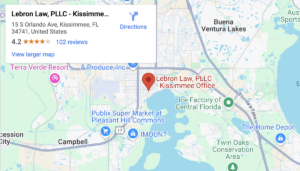
Going through a divorce in Kissimmee, Florida, can feel overwhelming. Whether you expect the process to be amicable or contentious, it’s normal to have questions about your rights and what to expect.
Understanding the basics can help you feel more confident moving forward. Here are answers to some of the most frequently asked questions about Florida divorce law.
What Are the Requirements for Getting a Divorce in Florida?

To file for divorce in Florida, known legally as a “dissolution of marriage,” at least one spouse must have lived in the state for six months before filing. You will also need to file your case in the appropriate county where either you or your spouse resides.
Florida is a “no-fault” divorce state. This means that you don’t need to prove that your spouse did something wrong to be granted a divorce. You simply need to state that the marriage is “irretrievably broken” or that one party is mentally incapacitated.
How Long Does It Take to Finalize a Divorce in Florida?
The length of time it takes to finalize a divorce in Florida depends heavily on the facts of the case. Some divorces can be completed in a few months, while others may take a year or more.
Factors that can impact the timeline include:
- Whether the divorce is contested or uncontested
- The complexity of issues like property division, alimony, and child custody
- How cooperative each party is during negotiations
- Whether the court’s docket is busy
Uncontested divorces, where both parties agree on all major issues, tend to move much faster than contested cases.
What Issues Must Be Addressed During a Divorce?
A Florida divorce can involve many important issues that must be resolved before the marriage can be legally dissolved.
These include:
- Property division: Marital assets and debts must be fairly divided. Florida follows an “equitable distribution” standard, meaning property should be divided fairly, but not always equally.
- Parental responsibility and time-sharing: The court will issue a parenting plan that outlines parental responsibility and time-sharing schedules based on the child’s best interests.
- Child support: One parent may be required to pay child support based on the Florida Child Support Guidelines.
- Alimony: Spousal support may be awarded depending on factors such as the length of the marriage and the financial resources of each spouse.
Each divorce is unique, and a family law attorney can help ensure your rights are protected throughout the process.
Can We Get a Divorce if We Agree on Everything?
Yes. If you and your spouse agree on all major issues, you can pursue an uncontested divorce. This can save time, money, and emotional stress.
In an uncontested divorce, you and your spouse would prepare and sign a marital settlement agreement that outlines how you will divide property, address alimony, and arrange custody if you have children. A judge will still need to approve the agreement, but the process is generally much faster and smoother than a contested divorce.
What Happens if We Can’t Agree?
If you and your spouse cannot agree on one or more important issues, your divorce will be considered contested. This means that the court will need to make decisions for you after reviewing evidence and hearing arguments.
Contested divorces may involve:
- Mediation sessions to attempt a settlement
- Pretrial hearings
- Discovery, including gathering evidence and taking depositions
- Trial before a judge
Contested cases take longer and tend to be more expensive, but sometimes litigation is necessary to protect your interests.
Is Mediation Required in Florida Divorce Cases?
In many Florida divorce cases, mediation is required before the case can proceed to trial. Mediation is a process where a neutral third party helps the spouses negotiate a settlement agreement.
Mediation can be an effective way to resolve disputes without the need for a court hearing. Even if mediation doesn’t result in a full agreement, it can often narrow the issues that must be addressed at trial.
How Is Property Divided in a Florida Divorce?
Florida courts divide property according to the principle of equitable distribution. The first step is to identify what assets and debts are considered “marital” and what is considered “separate.”
Marital property generally includes anything acquired during the marriage, such as income, retirement benefits, and real estate.
Separate property includes items owned before the marriage, inheritances, or gifts given to one spouse alone.
Once marital assets and debts are identified, the court will divide them in a way that is fair based on a variety of factors, including the length of the marriage, each spouse’s contributions, and each spouse’s economic circumstances.
Can I Get Alimony After a Divorce in Florida?
Yes, alimony (also called spousal support) may be awarded after a Florida divorce.
Whether alimony is appropriate will depend on factors such as:
- The length of the marriage
- The standard of living during the marriage
- Each spouse’s financial resources
- Each spouse’s age, health, and ability to work
Florida law recognizes different types of alimony, including bridge-the-gap, rehabilitative, durational, and permanent alimony. A family law attorney can help you understand what type of alimony might apply to your case.
Contact Our Experienced Kissimmee Divorce Attorneys for a Free Consultation
If you’re considering divorce in Florida or have been served divorce papers, it’s crucial to understand your rights and legal options. At Lebron Law, PLLC, our experienced Kissimmee divorce attorney will guide you through each step of the process and fight for the outcome you deserve.
Contact us at Lebron Law, PLLC today to schedule a free consultation and take the first step toward a more secure future. We can help you at (321) 800-5195.

